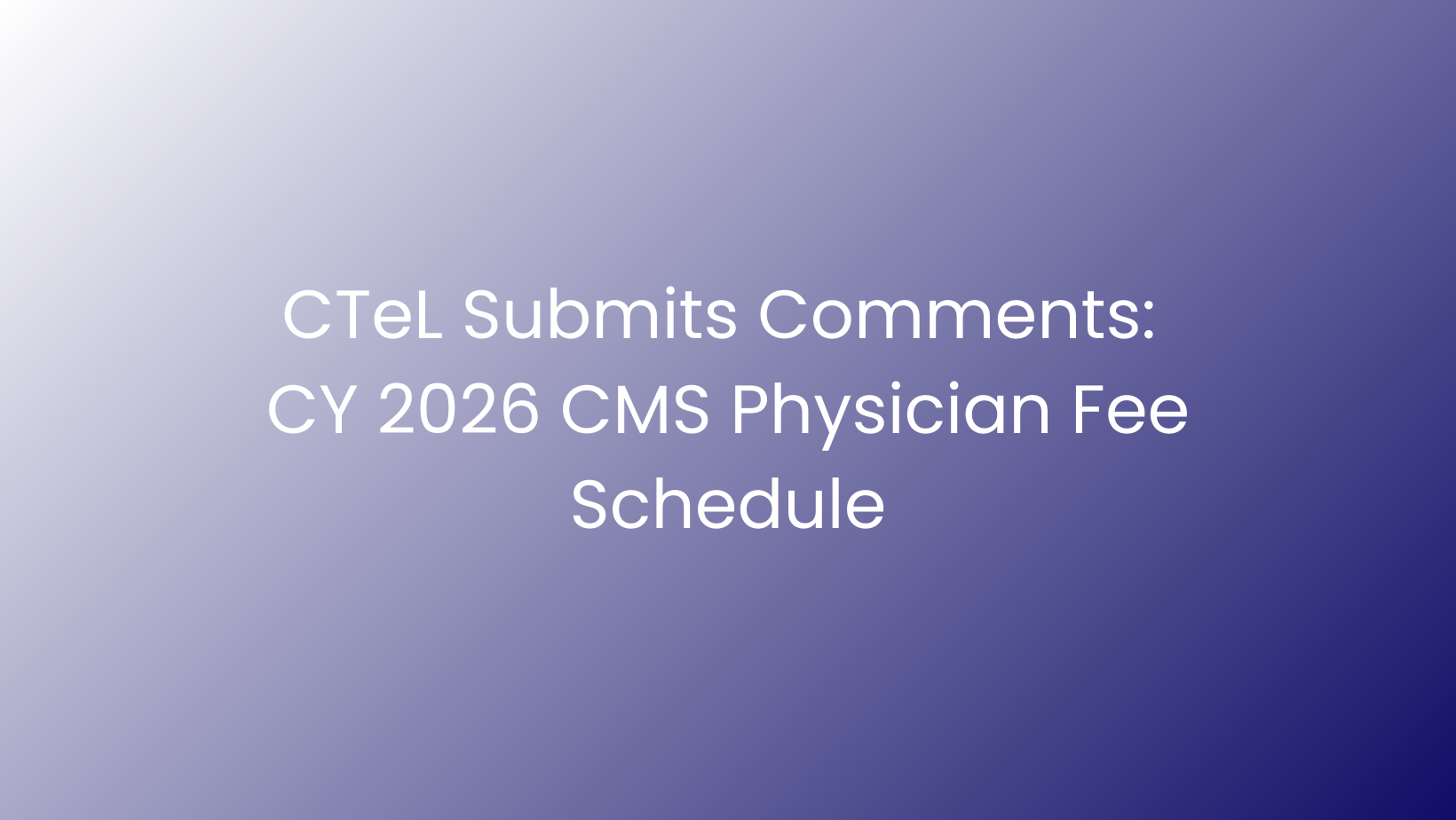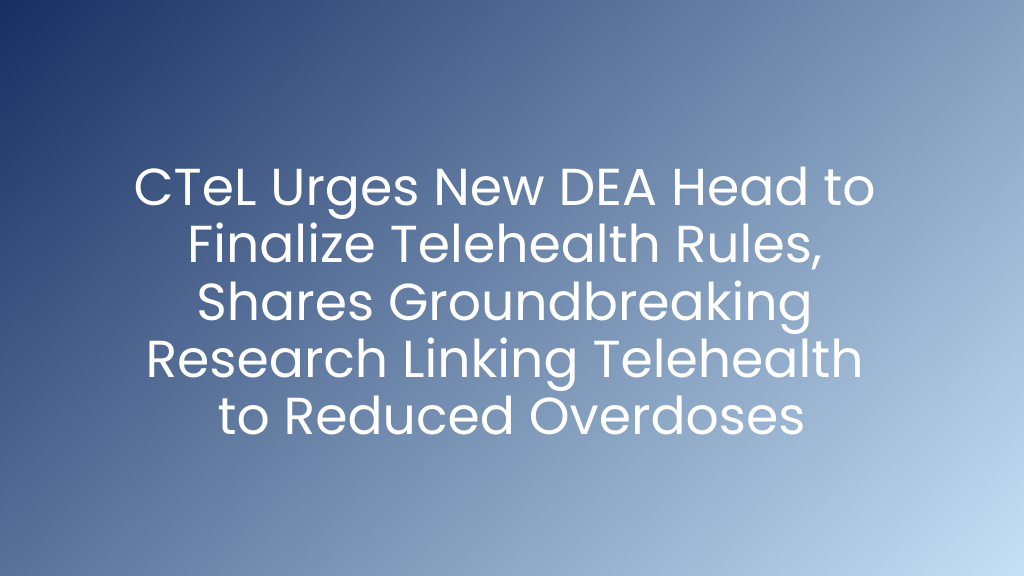Recent Comment Letter Submissions:
CTeL Submits Comments to FDA Supporting Telehealth Efficacy
Across all jurisdictions in the US, medical care delivered via telehealth is held to the same standards as care delivered in-person. Placing restrictions on the ability to prescribe medication via telehealth is inconsistent with telehealth’s demonstrable efficacy and would hinder its ability to bridge gaps in care access. We urge the FDA to refrain from placing restrictions on the ability for clinicians to exercise their clinical judgement and prescribe medication via telehealth.
CTeL Submits Collective Comments in Response to the 2026 CY CMS Physician Fee Schedule
The Medicare PFS sets the foundation for how physicians are reimbursed for their services and has significant implications for the future of health care delivery, payment, and innovation. CTeL’s recommendations focus on strengthening patient data security, fostering innovation in telehealth and artificial intelligence (AI), and ensuring equitable access to care for Medicare beneficiaries across the country.
CTeL Submits Letter to Urge New DEA Head to Finalize Telehealth Rules, Shares Groundbreaking Research Linking Telehealth to Reduced Overdoses
The Center for Telehealth & eHealth Law (CTeL), a leading nonprofit research institute, today announced it has sent a formal letter to the new Drug Enforcement Administration (DEA) Administrator, Terrance Cole, urging the agency to finalize its rules on telemedicine prescribing of controlled substances before the current waivers expire on December 31, 2025. In the communication, CTeL extended its congratulations to Administrator Cole and shared pre-publication results of a new study that demonstrates a significant reduction in nonfatal overdose rates in states with telemental health parity laws. The research, which has been provisionally accepted for publication in the peer-reviewed Journal of General Medicine, underscores the critical need for permanent, evidence-based telehealth policies
CTeL Submits Comments on: Health Subcommittee Hearing on Health at Your Fingertips: Harnessing the Power of Digital Health Data
The future of healthcare is digital, data-driven, and personalized. We appreciate the Subcommittee’s attention to the need for greater access to patients’ own health data, which we recognize as a key component of giving patients agency in their care. We are the Center for Telehealth and e-Health Law (CTeL), a 501 (c)(3) non-profit research institute that focuses on the legal and regulatory aspects of digital health. Our mission is to advance the understanding of legal, regulatory, and policy issues related to digital health through innovative research and analysis.
CTeL Comments on DEA Special Registration
Telemedicine prescribing flexibilities introduced by the DEA in response to the COVID-19 were a lifeline for patients in ensuring continuity of care. During this crisis, telehealth’s ability to help clinicians and patients adapt to unprecedented circumstances was clearly demonstrated, growing the modality’s option as a safe and effective means of accessing routine care. Continued extensions of this and other flexibilities serve to promote further continuity of care for patients who have come to rely on telehealth.
CTeL Submits Comments on CMS RFI: Health Tech Ecosystem
The Center for Telehealth and e-Health Law (CTeL) appreciates CMS’ proactive engagement in shaping the future of the health technology ecosystem. CTeL, a 501(c)(3) non-profit research institute, has been at the forefront of digital health policy for over two decades. Our mission is to conduct evidence-based insights that inform policy and shape the complex legal and regulatory landscape surrounding digital health. We have consistently served as a vital resource for policymakers, providers, and innovators, anticipating challenges and championing solutions in areas like telehealth reimbursement, remote patient monitoring, and the ethical integration of artificial intelligence in healthcare.
CTeL Submits Comments on Medical Device Tariffs
Digital health—including telehealth, remote monitoring, and AI—is bridging the care divide by connecting patients and providers in underserved areas. Telehealth brings top providers to remote communities, remote monitoring helps manage chronic conditions before they escalate, and AI streamlines data for faster, smarter decisions. Healthcare has never been more connected, collaborative, or holistic.
These innovations in care delivery would not be possible without devices to run them. Current tariff policies threaten the ability of providers to make investments in digital healthcare, which in turn drives advancements in care delivery that benefit all patients. We, the undersigned organizations, representing digital health providers and vendors, respectfully request that you consider a tariff exemption for medical devices under HS Codes 9018-9027.
CTeL Responds to Request for Information on the Development of an Artificial Intelligence (AI) Action Plan
Artificial Intelligence (AI) is poised to transform healthcare, improving patient outcomes, reducing administrative burdens, and enhancing clinician workflows. However, without cohesive federal leadership, the U.S. risks a fragmented regulatory landscape that could stifle innovation and limit AI’s full potential. The Administration must prioritize a robust AI Action Plan that fosters responsible innovation while protecting patient rights.
CTeL Advocates for Expanded Remote Monitoring Access to Strengthen Post-Acute Care
The Center for Telehealth and e-Health Law (CTeL) continues its advocacy for expanding remote monitoring capabilities in post-acute care, emphasizing the need for Medicare reimbursement policies that reflect real-world clinical applications. In a recent comment letter to the House Ways & Means Subcommittee on Health, CTeL underscored the value of Remote Physiological Monitoring (RPM) and Remote Therapeutic Monitoring (RTM) in reducing hospital readmissions and improving patient outcomes.
Comment Letter Archives
CTeL Response to W&M Hearing on Modernizing Healthcare
Our recent comment letter to the House Ways & Means Subcommittee on Health highlights key policy recommendations and innovations that are driving the future of healthcare delivery.
CTeL Advocates for Telehealth Access in DEA’s Buprenorphine Expansion Rulemaking
CTeL has officially submitted its comment letter to the Drug Enforcement Administration (DEA) in response to Docket No. DEA-948 - Expansion of Buprenorphine Treatment via Telemedicine Encounter and Continuity of Care via Telemedicine for Veterans Affairs Patients. This rule represents a pivotal shift in how telemedicine can be leveraged to address opioid use disorder (OUD) treatment, and CTeL is committed to ensuring that telehealth remains an accessible and effective tool for patients and providers.
Congressional Bipartisan Artificial Intelligence Task Force Publishes Report; CTeL Encourages Action
Revolutions in healthcare technology have the potential to usher in a new generation of medicine unbound by geography. Congress will play a central role in supporting the development and deployment of health technology to improve the quality and accessibility of patient care, and we are grateful for the Subcommittee’s attention to this matter.
CTeL Letter to Congressional Health Leadership re DEA
At the end of this calendar year, millions of Americans will lose their access to medications as the Drug Enforcement Administration’s (DEA) temporary extension of telemedicine flexibilities for prescribing of controlled medications comes to an end. We are concerned that the DEA will not act in time to issue a rule ensuring the long-term availability of telemedicine prescriptions and will allow these flexibilities to expire, jeopardizing the care of millions of Americans.
CTeL Responds to HR 238:
We at the Center for Telehealth and e-Health Law (CTeL), a 501c3 non-profit digital health research institute focused on the legal, regulatory, and policy challenges impacting access to healthcare, are concerned about the contents and scope of a bill you recently introduced: H.R. 238. This bill would upend decades of legal precedent and override states’ prerogative to regulate medical licensure and prescribing authority. We share in the position held by numerous medical societies and boards that artificial intelligence (AI) is best utilized as a tool to augment the capabilities of clinicians while preserving the core human elements of the practice of medicine.
CTeL Policy Priorities for 119th Congress
Revolutions in healthcare technology have the potential to usher in a new generation of medicine unbound by geography. Congress will play a central role in supporting the development and deployment of health technology to improve the quality and accessibility of patient care, and we are grateful for the Subcommittee’s attention to this matter.
Telehealth Expansion Needed in Reconciliation for Seniors; Rural Communities
As the 119th Congress gets underway, we are excited by the prospect of a reconciliation bill as a potential vehicle for much-needed healthcare reform. As you and your committees consider a wide range of policy proposals, we hope that you will keep telehealth in mind by including a critical extension of Medicare telehealth access and by limiting facility fees for telehealth services.
















